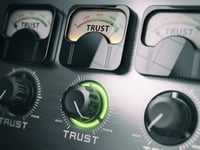
How and why fear is sabotaging your sales
Salespeople can be some of the most fearless people in the world. It takes guts to pick up the phone again after you’ve been told “no” over and over. It takes guts to step in front of committees of decision-makers and tell them why they need to change and place their trust in your and your company to help them.
It takes guts to keep coming to work day after day with an uncertain outcome and often an uncertain paycheck.
But that doesn’t mean that fear isn’t sabotaging your sales efforts.
Fear is a sneaky phenomenon. It creeps in the darkness and can drive behaviors without us even realizing we’re afraid.
And that can spell danger for sales departments, especially in a delicate economic environment like the current one.
Here’s what you need to know about the science of fear, and how it impacts organizations at every level.
Fear is a biochemical response to stress, real or imagined
Fear is an ancient evolutionary response programmed into our bodies as a survival mechanism. When you perceive a threat, real or imagined, your fear system kicks in and the following things happen:
- Your pre-frontal cortex receives information from your environment and “decides” whether to send that information to your amygdala for an immediate physiological response, or whether to send it to your sensory cortex for further analysis and conscious processing.
- Your amygdala is one of the most ancient parts of the human brain. When it receives information telling it that a threat is immediate and dire, it sends signals to the rest of your fear system to start pumping hormones into your body.
- Your hypothalamus pumps hormones into your body in response to the amygdala’s orders. Once these hormones are activated, you feel the effects of fear in your body, even if you are not conscious of them. Your heart rate increases, you perspire, you may breathe harder. You may experience emotional discomfort.
- Your brain stem, hippocampus, and other parts of your fear system may trigger a freeze, fight, flight, or fawn response.
All of this happens quickly and without your conscious input. Depending on the severity of the fear and your self-awareness, you may become strongly conscious of the effects of fear, or it may remain entirely unconscious to you.
Fear is a sneaky phenomenon that can drive behaviors without us even realizing we’re afraid.
Even if it is unconscious, however, it will impact you.
People respond to fear in one of four primary ways
Scientists are still unclear on all of the mechanisms of fear in the body, but they have identified four primary ways that people respond to fear:
- Fight
- Flight
- Freeze
- Fawn
The fight-or-flight response is the one most people are familiar with, while “freeze” and “fawn” have been more recently added to the list.
In fight response, your body prepares for a battle.
In flight response, your body prepares to run away, as fast as you can.
In a freeze response, your body prepares to “play dead”–I.e., freeze in place and hope the threat ignores you.
In the fawn response, your body prepares to appease the threat and so that it will leave you alone.
When fear is extreme, these responses may be automatic and unstoppable. In less severe situations, you may experience the response as a strong desire to do one of the four things. In mild situations, it may manifest simply as a tendency to choose one of those four reactions.
How the four fear responses show up in the sales organization
It may have been a long time since your heart rate increased just because you had to pick up the phone and call a prospect. But that doesn’t mean that fear isn’t sabotaging sales in your organization.
Here’s how the four responses can show up at the different levels of your organization.
- Fight Response
The fight response is what happens when salespeople are afraid to lose a sale, and so they become more aggressive. This can show up as jumping straight to the presentation, getting defensive in response to customers’ questions, or overselling the product.
At the management level, the fight response can show up as hyper-focusing on everything that’s wrong with the team, reassigning territories aggressively, taking over projects, or firing and demoting without first attempting to help struggling salespeople.
At the organizational leadership level, fearful leaders may go to war with the sales force, handing down aggressive and unrealistic quotas, demanding unrealistic results, and overinvesting in technology without first taking the time to understand the problems they’re trying to solve. - Flight Response
The flight response shows up for salespeople in some very common ways: Failing to make enough calls, failing to follow-up, failing to ask about budget, and failing to ask for access to decision-makers. All of these outcomes, and many others, are a result of choosing to “fly” in the face of fear.
Managers may take the “flight” response when they avoid conflict with their salespeople by avoiding them, hiding behind their desk, and managing via email, rather than facing their people head-on and actively managing their performance.
At the organizational leadership level, fearful leaders may cut costs suddenly and dramatically without a strategic approach. Or, their fear may manifest more subtly as a general unwillingness to engage with problems and address them, choosing instead to hide behind a desk and hope for the best. - Freeze Response
Salespeople may be in a freeze response when they stick too tightly to scripts without engaging customers, listen to prospects without engaging them, or allow the prospect to push them around and make all the decisions. You may hear a freeze response on their end of a phone conversation when they start saying, “Uh huh. Uh huh. Yeah. Uh huh,” in place of meaningful engagement.
Managers may be even less obvious, by simply “abandoning” their people to their own devices, and burying themselves in busywork. Or just cutting out early and going home.
Similarly, at the organizational level, leaders may become disengaged from the needs of the company and stop leading. This may mean that they don’t make appropriate investments in technology and consulting, don’t engage in strategic planning, and/or they stick with “tried and true” approaches instead of adapting and innovating to meet the market. - Fawn Response
Salespeople demonstrate the fawn response when they prematurely offer discounts and other perks, and when they are overly solicitous of the customer, bending over backward to get a sale, even if it won’t be profitable for the organization. They may also refuse to challenge a prospect, instead choosing to overly praise them even when they’re wrong.
Managers likewise can be overly nice to salespeople, killing them with praise without also challenging them to improve. They may become mindless cheerleaders in place of meaningful leaders.
At the organizational level, the fawn response can show up in allocating resources to reward salespeople without a plan for how it will impact performance, as well as in the “buy more stuff” syndrome that leads to point pollution and the Hydra.
Do you notice any of these responses showing up in your sales organization? How and where?
One way to overcome fear responses is to become intentional about how you structure the sales organization and your sales process to reinforce correct behaviors and guide salespeople so that they know what the right thing is, as well as how to do it.
A platform like Membrain can provide this structure, and help you eliminate the impacts of fear on your sales organization while improving your overall performance. Ask us how.

By George Brontén
George is the founder & CEO of Membrain, the Sales Enablement CRM that makes it easy to execute your sales strategy. A life-long entrepreneur with 20 years of experience in the software space and a passion for sales and marketing. With the life motto "Don't settle for mainstream", he is always looking for new ways to achieve improved business results using innovative software, skills, and processes. George is also the author of the book Stop Killing Deals and the host of the Stop Killing Deals webinar and podcast series.
Find out more about George Brontén on LinkedIn







